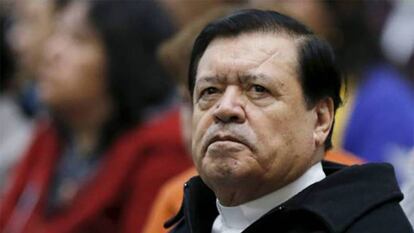Archbishop of Mexico City: “A child is more likely to suffer sexual abuse at the hands of a homosexual father”
Conservative cleric ups the stakes in his campaign against government plans for same-sex marriage


The powerful archdiocese of Mexico added fuel to the already inflamed debate about gay rights on Sunday after its weekly magazine, Desde la fe (In faith), published an article by one of the leading conservative voices of the country’s Roman Catholic Church.
Arguing against same sex marriage and adoptions by gay couples, Cardinal Norberto Rivera listed a catalogue of calamities that supposedly befall children raised by gay parents: higher rates of disease and emotional instability, lower success rates in school and greater risk of sexual assault. “A child is more likely to suffer sexual abuse at the hands of a homosexual father,” the cardinal said in the religious weekly.
The cardinal also turns his sights on “the homosexual lifestyle” and its health risks
This homophobic attack was carefully timed. Rivera, who runs the weekly, has launched a campaign against President Enrique Peña Nieto’s efforts to push through legislation recognizing same-sex marriage, after Mexico’s Supreme Court ruled that defining marriage solely as a union between a man and a woman violated the Constitution. Rivera has mobilized his army of followers and encouraged a series of demonstrations that culminated in a huge march against gay marriage and by proxy, the secular state, on Saturday in Mexico City.
The day after that show of force – tens of thousands participated in the march, which received the Pope’s blessing – the archbishop published his vitriolic attack in the religious magazine: “Wherever this law has been passed, anybody disagreeing faces fines and prison. Hotel owners have already been arrested for not admitting homosexuals to their rooms, bakers who refuse to decorate a wedding cake for gays have been fined, as have fathers who are against schools teaching their kids that homosexuality is natural.”
The cardinal also turns his sights on “the homosexual lifestyle” and its health risks. “Countless scientific studies show that homosexuals are more likely to suffer and contract sexually transmitted diseases,” he said.
But his attack on adoption by same-sex couples caused particular surprise: “It has been shown that children of homosexual parents are in fact affected: their self-esteem, sexual identity, emotional stability, performance at school, etc…”
Rivera listed a catalogue of calamities that befall children raised by gay parents
Cardinal Rivera and his supporters warn that “gender ideology” will creep into Mexico’s schools, “as has happened in the United States and Europe.” An educational model that has led, in the senior cleric’s judgment, to a loss of values in places such as Spain and Germany. “In those countries, children are encouraged to mutually explore each other’s private parts, practice masturbation, exchange clothes – the girls dress like boys and the boys like girls – in order to feel comfortable with the idea of belonging to another sex,” Rivera said.
The cardinal also denied that the pope had recommended the Catholic Church apologize to gay people for the way it has treated them over the centuries.
It is worth noting that Rivera repeatedly defended Marcial Maciel, the founder of the Legionaries of Christ movement, which after his death in 2008 admitted he had sexually abused young boys for decades.
English version by Dyane Jean-François.
Tu suscripción se está usando en otro dispositivo
¿Quieres añadir otro usuario a tu suscripción?
Si continúas leyendo en este dispositivo, no se podrá leer en el otro.
FlechaTu suscripción se está usando en otro dispositivo y solo puedes acceder a EL PAÍS desde un dispositivo a la vez.
Si quieres compartir tu cuenta, cambia tu suscripción a la modalidad Premium, así podrás añadir otro usuario. Cada uno accederá con su propia cuenta de email, lo que os permitirá personalizar vuestra experiencia en EL PAÍS.
¿Tienes una suscripción de empresa? Accede aquí para contratar más cuentas.
En el caso de no saber quién está usando tu cuenta, te recomendamos cambiar tu contraseña aquí.
Si decides continuar compartiendo tu cuenta, este mensaje se mostrará en tu dispositivo y en el de la otra persona que está usando tu cuenta de forma indefinida, afectando a tu experiencia de lectura. Puedes consultar aquí los términos y condiciones de la suscripción digital.








































